BODY HEAT
Wednesday, April 12, 2023
Body Heat: A Review (Review #1709)
Monday, April 10, 2023
Air (2023): A Review
AIR
The machinations of big business get a surprisingly upbeat look in Air, the story of how Nike got an up-and-coming sports player to their product and dominate the market.
Nike basketball shoe division executive Sonny Vaccaro (Matt Damon) is struggling to find the budget and the marquee player to save the floundering division. Over loud objections from VP Rob Strasser (Jason Bateman) and Nike CEO Philip Knight (director Ben Affleck), Sonny pushes hard for a bigger budget and pursuit of third-round NBA draft pick Michael Jordan.
Jordan leans strongly towards rival company Adidas, but Sonny is convinced that Jordan is worth pursuing. Coming up with the idea of building the shoe around Jordan rather than merely attaching a particular style to him, Sonny is relentless. He even, again over loud objections from Jordan's agent David Falk (Chris Messina) goes over everyone's head and makes his pitch to Jordan's mother, Deloris (Viola Davis).
Mrs. Jordan surprisingly agrees to have Nike court her son, as do Adidas and Converse. Now Sonny, Strasser and fellow Nike executive Howard White (Chris Tucker) must come up with both a pitch and a shoe to get Jordan to sign. Will shoe designer Pete Moore (Matthew Maher) get his "Air Jordans" to win over the young player? Will Nike outwit and outlast bigger, wealthier companies to be like Mike?
Air, on the surface, looks like a surprisingly boring story. Who could build up interest around shoes? What makes Air interesting is not so much the procedures to get Michael Jordan's endorsement. Rather, it is the humans behind the product. Each figure, from the driven Sonny to the eccentric Knight, have their own motivations in this mad pursuit of the unobtainable. While no doubt motivated by rich financial rewards, Air also shows that qualities like pride in work and desire to achieve in their own world can be equal drivers.
Perhaps the most moving story is that of Strasser. He can yell and be stubborn in his obstinance with Sonny, but we also see the people behind the marketing. Via Alex Convery's screenplay, Bateman gives a quiet monologue relating how his job is the only entry he has to visitations to his daughter post-divorce. Even if the company shuts down the basketball division, he says, he would continue buying a pair of shoes to bring her.
That and another silent scene where Sonny sees all the employees at their jobs brings to focus that the intricacies of finance and marketing have people behind them. They depend on these jobs to provide for themselves and their families. The jobs also give them a purpose, and it is that focus on the individual that pushes Air into a strong, smart film.
Even Mrs. Jordan sees that the Nike deal is not about dollars and cents alone, but his worth. His actual worth. Air reveals that things like respect, the individual's value and commitment to an idea and ideal is as important as what the cash results are.
I think that Ben Affleck is a better director than actor. Out of his filmmaking efforts, only Live by Night has been a failure. Affleck will almost always cast himself in his own films (Gone Baby Gone being the exception, though to be fair his brother Casey is the lead). This time, he is the supporting character, and this time Affleck did better than when he is the center of attention. His Phil Knight is casually eccentric, meaning that we hear bits about Buddhism but nothing that shows his offbeat brand of genius.
While not a bad performance, Affleck shrinks next to the rest of the cast. Damon brings that everyman quality as Sonny, determined, driven, aware he is right but with no one listening. Bateman and Davis are the real strong figures here. The former portrays Strasser as committed but not eager to take chances. The latter displays a quiet strength coupled with a shrewd mind.
Kudos should also go to Messina, whose rants had audiences in laughter but for the right reasons. Unsung is Julius Tennon as James Jordan, Michael's father. Amiable, affable and eager, he is a jolly figure throughout the film.
I think Air was maybe longer than it should have been (it runs almost two hours). It also does all but hide Jordan (we never see his face and he says three words: "Bulls colors" on seeing his new shoe and "Hello" over the phone at the end) but those are minor complaints. Well-paced, well-acted and with a story that grows on you, Air may not make me want to be like Mike, but you do end up wanting to cross over into the world of Jordan.
Friday, April 7, 2023
The Super Mario Bros. Movie (2023): A Review
THE SUPER MARIO BROS. MOVIE
I never played video games, though Mario Brothers is so dominant in the culture that you just have to play first seven notes of the original game, and everyone recognizes it. This newest film adaptation of the game is pleasant enough: kid-friendly, not deep, but with enough charm to entertain.
Struggling Brooklyn plumbers Mario (Chris Pratt) and his brother Luigi (Charlie Day) are finally breaking out with their new plumbing business when they find themselves swept away into a fantastical universe. Mario ends up in the Mushroom Kingdom, where Princess Peach (Anya Taylor-Joy) rules benevolently over the Mushroom Toad people. Luigi, a far more frightened person, ends up in the Dark Lands, ruled by the evil Bowser (Jack Black).
Bowser, determined to rule this universe and marry Peach, has already taken the all-powerful Super Star as a bargaining chip over Peach. Peach decides to ask for the Kong Kingdom to join in an alliance against Bowser and his Koopas, bringing Mario and Toad (Keegan-Michael Key) with her. King Cranky Kong (Fred Armisen) won't join unless a champion can defeat his son, Donkey Kong (Seth Rogen). Mario, determined to help rescue Luigi, takes the challenge.
Eventually, Bowser arrives at the Mushroom Kingdom to pressure Peach for the marriage. Will Peach be forced to join in this unholy union, or will Mario and Luigi join forces to save both their worlds?
As family films go, The Super Mario Bros. Movie is inoffensive and pleasant. Cute is the best word to describe the film, and there is nothing wrong with that. As I saw the audience, particularly children, I saw that they found the adventures of Mario and Luigi a fun frolic.
On certain levels, The Super Mario Bros. Movie is not original. It even devolves into some bad cliches. This is the second film this year where Bonnie Tyler's Holding Out for a Hero is played over a montage (Shazam! Fury of the Gods being the other). The film opts for using the soundtrack to fill in whatever passes for plot. Using a-ha's Take On Me and AC/DC's Thunderstruck for montages is a pretty simple way to set mood.
One also wonders about the plotline of Bowser wanting to marry Peach. It might have been funnier if it had come out of nowhere versus being out there from the start.
The film also puts in plugs for potential sequels, which undercuts the film itself. We get hints about Peach's origins and end with Mario and Luigi going through a drainpipe either to travel to their world from the Mushroom Kingdom or for other adventures.
Still, as I think on the film itself, I find more positives than negatives. Explanations were given for the lack of Italian accents (it's a promotional gimmick, though to be fair, if the brothers are Brooklyn born-and-raised, why would they have Italian accents to begin with). The voice cast was uniformly good. Pratt was pleasant as Mario, playing the stabs at drama with a wonder at the world he was in. Day brings that nervous, frightened manner to Luigi, and Taylor-Joy brings confidence to Princess Peach without slipping into "girl-boss" mode. Key's Toad will delight kids with his perky manner.The film is colorful, and even the curious nature of Lumalee, the Luma whose cheerful pessimism is funny in its misery. Forever speaking words so sad with an upbeat voice, the character ends with what sounds like a sad note while still keeping to an almost cute manner.
The Super Mario Bros. Movie has perhaps one too many slow-motion moments to emphasize the action but given that the film aims for nothing more than to entertain kids and their parents, it can be forgiven. Pleasant, cute and self-aware without winking at the audience, The Super Mario Bros. Movie will entertain the kids when it inevitably finds itself on permanent rotation at your local daycare.
Thursday, April 6, 2023
Cocaine Bear: A Review
COCAINE BEAR
Cocaine Bear promises, on title alone, to be a goofy good time. Loosely based on a true story, Cocaine Bear fails even in being said goofy good time.
Georgia, 1985. A drug smuggler drops massive loads of cocaine from the sky and ends up dead when he knocks himself unconscious and falls. A bear happens upon some cocaine and ingests it. Now totally high and out-of-control, the bear goes on a murderous rampage.
That rampage affects a group of disparate people. There are the drug runners: Syd (Ray Liotta), his right-hand man Daveed (O'Shea Jackson, Jr.) and Syd's weepy son Eddie (Alden Ehrenreich). There is park ranger Liz (Margo Martindale) and her possibly platonic, possibly not friend Peter (Jesse Tyler Ferguson). Three minor hoodlums also get mixed into the murder and mayhem. Perhaps the most in danger is Dee Dee (Brooklyn Prince), a young girl who has skipped school with her BFF Henry (Christian Convery) to paint in the forest. Dee Dee's mother Sari (Keri Russell), begins her desperate search, not helped by anyone.
As these various figures cross paths, the bear keeps on killing, creating havoc and chaos everywhere she goes. Who will live and who will die from a drugged-crazed bear?
I think most people expected Cocaine Bear to be something campier and more outlandish than what we ultimately got. I think it is because the Jimmy Warden script thought audiences would care about the people versus just catering to their hopes for gleeful slaughter.
Though at a surprising 95 minutes, Cocaine Bear feels longer, primarily because the film wanted desperately to build up drama with uninteresting characters. Why we needed to get Eddie's tragic stories of his wife and friend's death the film does not answer. Cocaine Bear gives us so many stories (the Duchamp crime gang, the drug runners, an out-of-town detective attempting to find the cocaine, Sari and Dee Dee, the ranger and her potential boy-toy), that it soon starts losing focus.
There was no need to introduce so many characters, especially if you are going to have a short film. Audiences, I think, wanted to see a coked-out animal run wild through the forest, not delve into Eddie's emotional crises or Syd's efforts at raising his grandkid. Even Eddie's bad tattoo, where he had "John" instead of "Joan" inked, is cause for him to cry.
That "John/Joan" bit is not funny because it has not been set up. Given Ehrenreich's performance, one is not sure if Eddie is supposed to be in a comedy or some deep drama.
I put it down to director Elizabeth Banks, who had a wild imbalance in style. She could not get Russell to decide if she had a Southern accent or not (it comes and goes at will). She could not get Ehrenreich to decide if he was in a family tragedy film or a silly comedy. Liotta played it straight, and it saddens me that one of his last screen credits ends with him getting cut open by a bear and her cubs while being hung by his own esophagus.
To be fair, both Martindale and Jackson, Jr. did well, as if they knew Cocaine Bear was camp and played it as such regardless of what Banks and Warden did. Everyone else pretty much ran the difference from bored to over-acting.
The one good scene is when the ambulance attempts to flee the bear with a critically injured Liz. While I am not sure having Depeche Mode's Just Can't Get Enough play during the scene was a good idea, at least it gives Cocaine Bear a bit of a jolt. This scene has some energy and some of the outlandish humor I thought Cocaine Bear was aiming for.
Unable to decide whether to fully embrace its wild premise or try and play it more straightforward, Cocaine Bear's schizophrenic manner ends up killing what could have been frothy fun.
Wednesday, April 5, 2023
Operation Fortune: Ruse de Guerre. A Review (Review #1705)
However, Fortune's former partner and now frenemy Mike (Peter Ferdinando) is also after The Handle. Fortune is now in a spy vs. spy scenario to get access to Greg Simmonds (Hugh Grant), the notorious and eccentric arms dealer who will be the seller. A most unusual way is found to get close to Simmons. It is American action star Danny Francesco (Josh Hartnett), who is Simmons' favorite movie star. Francesco is blackmailed into participating, but despite his hesitancy and common sense now finds he likes Simmons.
Tuesday, April 4, 2023
Creed III: A Review (Review #1704)
CREED III
As of this writing, I have memories of Creed and did not see Creed II. With that said, I went into Creed III with some vague ideas of what had gone on before. Creed III in its almost two-hour runtime says a lot, but doesn't say much.
Adonis Creed (director Michael B. Jordan) is on top of the world, his last fight a successful one and ready for retirement. His beautiful wife Bianca (Tessa Thompson) and deaf daughter Amara (Mila Davis-Kent) are his world. His boxing training center is his business. Now, however, the past has
caught up to him, in the form of Damian "Dame" Anderson (Jonathan Majors).
Twenty years ago, Damian was the king of underworld boxing, with Adonis as his running buddy. A crime, however, sent them on different paths: Adonis eventually to his biological father's family, Damian to prison. Now, Damian wants another shot to box again. Creed gives him that chance by being the sparring partner to his newest protege, but Dame's rough manner is a harbinger of things to come.
Dame gets his chance through some shady means, and now Dame is after Creed. Adonis will now have to come out of retirement to challenge his frenemy in an epic battle for more than the heavyweight championship of the world.
I am not sure who came up with some of the decisions in Creed III, but they were a bit curious. Screenwriters Zach Baylin and Keenan Coogler (whom I suspect is related to Ryan Coogler, who has a story by credit and is one of Creed III's producers) apparently just looked at some Rocky movies and decided to take some elements for the film.Damian, for example, is a variation of Rocky III's Clubber Lang. The intense fighter whose fight puts the rival's life in danger has a touch of Rocky IV to it. Granted, the difference is that unlike Rocky IV, Damian's challenger Felix Chavez (Jose Benavides, Jr.) is not killed in the ring. However, he is more plot device than genuine character given that outside a quick appearance at the Creed/Anderson bout, he is not mentioned again.
It would have been impossible to play that angle since Creed II already brought about the sons of Rocky IV's Apollo Creed and Ivan Drago. Curiously, Ivan Drago, Jr.'s withdrawal from the fight appears inspired not by the Rocky films but by all things I, Tonya.
Even by its curious universe, Creed III asks its audience to believe simply outlandish things. There is no way that Damian, fresh out of prison, would not only get a bout against the reigning heavyweight champion but that said match would draw massive crowds and a big pay-per-view audience. Creed III does depend on implausibility and idiocy from the characters.
For example, Damian tells Adonis that he wrote to him while in prison. Adonis says he never got these letters, but not once until either shortly before or after his father's wife Mary Anne (Phylica Rashad) passes did it ever occur to him to so much as look, let alone ask.
It also has first-time director Jordan do something that many first-time directors, particularly actors-turned-directors, go for. There is an unfortunate habit of focusing more on the visuals than on the performances, and Creed III did this. The climatic fight between Adonis and Damian devolves into some bizarre almost anime-like sequence. The visuals, where a metaphorical cage descends on them as they shifted from Dodgers Stadium to a netherworld, has as its purpose to just call attention to itself.
A odder situation is when the Creed family is having dinner. The scene is so dark it becomes hard to see what is going on, a strange decision by Jordan. Quoting the music from Rocky does not help in trying to break away from the Rocky mythos and having the Creed series stand on its own.
The performances were fine though unmemorable. Jordan has good moments with Davis-Kent, though in another aspect of Creed III's habit of not mentioning things, she gets into a fight with a bully, and this is never brought up again. Rashad's last scene where in her stroke-addled confusion mistakes Adonis for Apollo is also effective, a credit to Rashad.
I think Creed III is an acceptable crowd-pleaser if you care about this Rocky spinoff. I cannot say I was enthusiastic about it, but I can't find much to say I hated it.
Saturday, April 1, 2023
Lucy (2003): The Television Movie
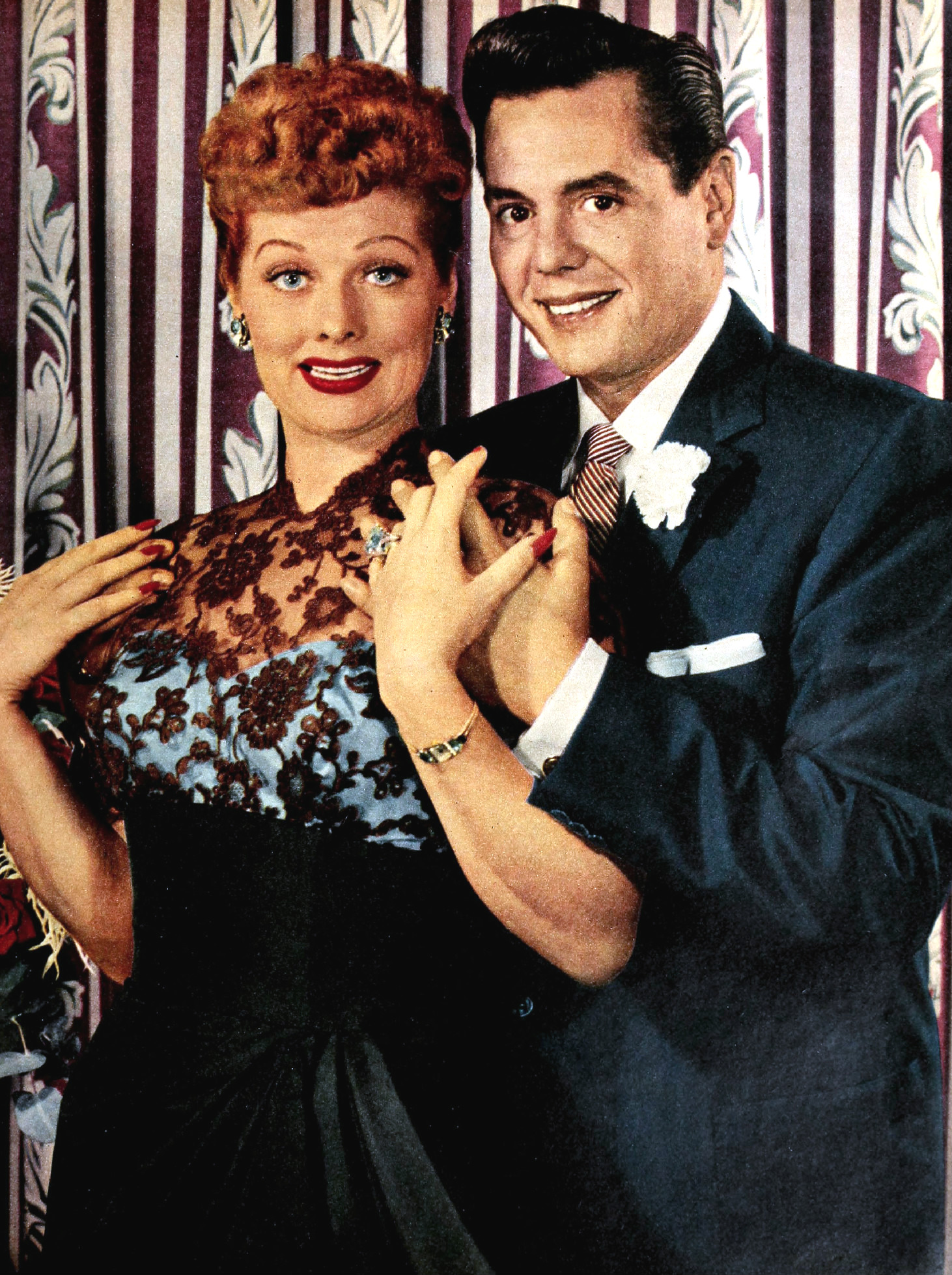 |
| Lucille Ball: 1911-1989 Desi Arnaz: 1917-1986 |


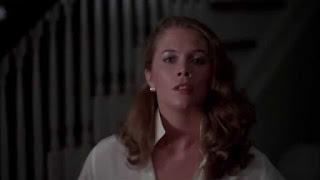
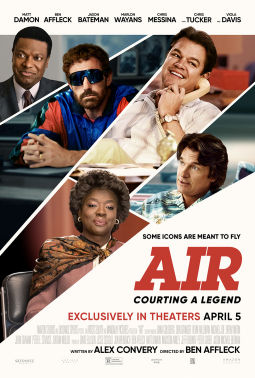

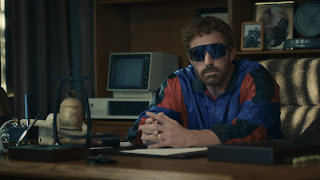



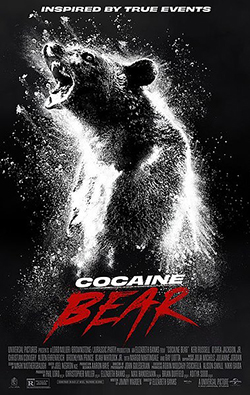






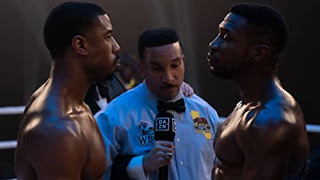

.jpg)
